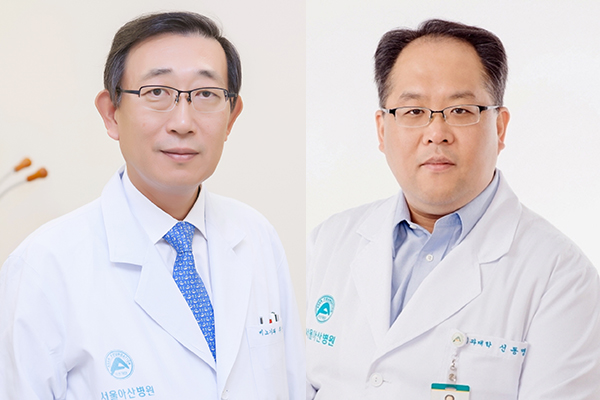-
- Global AMC MENU
- NEWS
- HEALTH
- PEOPLE
- Introduction

▲ (From the left) Professor Myung-Soo Choo (Urology) and Professor Dong-Myung Shin (Biomedical Science)
Interstitial cystitis which causes severe bladder pain due to mucosal bleeding and ulcer in the bladder accompanies dysuria such as frequent and urgent urination and nocturia. While there is no definite treatment for interstitial cystitis, it is expected that stem cells may open the door to curing interstitial cystitis in the near future.
AMC team led by Professor Myung-Soo Choo of the Department of Urology and Professor Dong-Myung Shin of the Department of Biomedical Science recently revealed findings from a phase 1 clinical trial in which 3 patients with severe interstitial cystitis were administered with mesenchymal stem cells derived from human embryonic stem cells. The trial was the first of its kind in the world and the patients experienced temporary pain improvement without any adverse events including immune reaction.
The research team administered mesenchymal stem cell therapy derived from human embryonic stem cells to the bladder mucosa in 3 patients with severe interstitial cystitis whose conditions had not improved with existing treatments. The therapy was administered to 5 bladder submucosa sites including Hunner lesions (ulcer-like lesions with a major clinical feature of interstitial cystitis) with a total dosage of 5cc, 1cc per session.
The progress of patients was observed over the next 12 months and the results showed that the pain was temporarily alleviated in all patients. 2 patients out of 3 particularly experienced temporary pain alleviation to the extent that they did not have to take existing therapy products even without cauterization of Hunner lesions. In addition, no obvious abnormalities were found in hematology, biochemistry, urinalysis, and abdominopelvic computer tomography (CT) tests.
Professor Choo said, “Patients with interstitial cystitis have not been able to achieve full recovery and would often complain about multiple symptoms including dysuria, sleep disorder, depression, and anxiety. When stem cell therapy is applied to patients with severe interstitial cystitis who had not responded to existing medications, we can expect higher quality of life for the patients.”
Professor Shin said, “It was confirmed from this phase 1 clinical trial that stem cell therapy can be a desirable treatment option for patients with interstitial cystitis. Further follow-up studies are also required to closely examine the safety and effectiveness of stem cell therapy.”
This study confirmed the clinical safety of stem cells in treating interstitial cystitis for the first time. In recognition of such achievement, research findings were published in the latest issue of ‘Stem Cells Translational Medicine,’ a renowned journal in the field of stem cell research.












